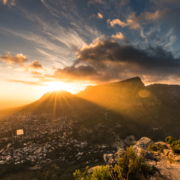The new world disorder: Why SA can no longer be a bystander
It is hard to ignore the feeling that we have been here before: Another United States (US) president threatening tariffs, another Chinese countermeasure, and another shock rippling through markets. But something feels different this time. President Donald Trump’s plan to impose 100% tariffs on virtually all Chinese imports is not just an economic manoeuvre; it is the loudest signal yet that the era of globalisation as we know it is ending. For the past three decades, the world’s economy has been organised around efficiency. Now, it is being reorganised around control. Supply chains are becoming weapons, trade routes bargaining chips, and tariffs tools of ideology rather than economics.
A fragile global calm
The irony is that, on the surface, the global economy still appears resilient. Growth in the US remains firm, driven by pre-emptive spending and the hype surrounding artificial intelligence. Yet, this resilience may be less strong than a reflex, a final push before gravity sets in.
The stock market is booming even as policy clarity collapses. Forecasts from economists diverge more widely than at any point since the pandemic in 2020. The world is in a state of confusion, and that confusion itself is becoming the new normal. Investors are betting not on stability but on volatility, buying both risk and insurance at once. This is no longer a business cycle; it is a confidence cycle. And confidence is a fragile thing. When politics replaces predictability, capital behaves like water: Flowing quickly to the lowest-risk channels and away from places that can least afford it.
South Africa’s (SA’s) tightrope
For SA, the danger is not being targeted by tariffs but being caught in the undercurrent. Our economy is small, open, and dependent on stable trade flows. We do not export enough to the US to be collateral damage but we import heavily from a global system that is fragmenting. If the world keeps fracturing into trade blocs, SA could lose more from disconnection than from direct sanctions. In such a world, neutrality becomes a liability. Remaining on the sidelines may keep us politically safe but economically vulnerable. China is already pivoting toward the Global South, recasting Africa as a preferred partner. This creates opportunity but only for those ready to move. If we wait for others to redraw the global map, we will find ourselves at its edges.
The real risk: Strategic inertia
The deeper problem is not tariffs or capital outflows. It is strategic inertia: The tendency of countries and companies to assume that today’s disruptions will pass. They will not. The global order is not in turbulence; it is in transition. SA’s policymakers should use this moment to rethink our economic posture. Can we build an industrial base that is less dependent on external supply chains? Can we leverage our mineral wealth to become indispensable to both the East and the West, rather than a supplier of convenience? Can our trade policy move faster than geopolitics? Waiting for the storm to pass might once have been sensible. But this is not a storm; it is climate change.
Final thoughts
The next decade will belong to countries that treat uncertainty as a strategy, not as a risk. The US is playing offense, China is playing long-term positional chess, and the rest of the world is still adjusting its pieces. SA must decide whether it will simply observe this match or learn to play it. Because when the world economy rewrites its rules, those who only read the fine print after the fact rarely make it to the next round.
This article has been published on Moneyweb.





